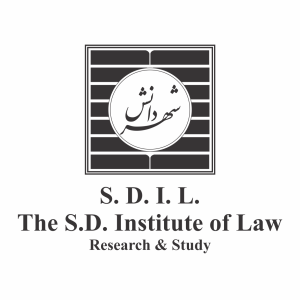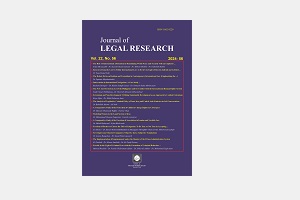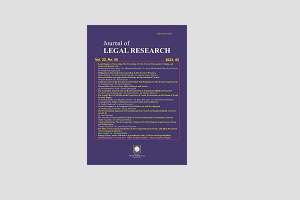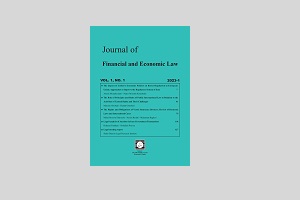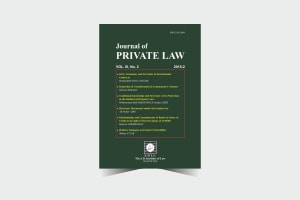Journal of
LEGAL RESEARCH
Number 37
Vol. XVIII ● No. 1
Spring 2019
Managing Editor: Vahid Eshtiagh
Editor-in-Chief: Seyyed Ghasem Zamani
CONTENTS
Articles
A Postmodern Critique of Legal Positivism in International Law
Dr. Alireza Bagheri Abyaneh & Dr. Mojtaba Ansarian
Appearance of New Trend in Interpretation of the UN Security Council Resolutions; from Generalization of General Rules of Interpretation Dilemma to Providing Special Interpretation for Specific Organ
Yaser Salarian & Mahdi Khalili Torghabe
Analysis of the Exceptions to the Prohibition of Forced Labor in Iran’s Current Laws and International Labour Organization Conventions No. 29
Dr. Mohammad Mazhari & Farzad Jangjooi (Kharata) & Akbar Lotfi Aziz
Specific Obligations of Telecommunication Services in the World Trade Organization
Zahra Moshref Javadi
A Study of Reasoning Requirement of Arbitration Awards in International Investment Disputes Settlement
Sepehr Hasankhanpour & Amirhosein Haghighi
Reflection on Criminal Policy on Direct Tax Law Emphasizing the Amendment Law on Direct Tax Law 31/04/1394
Dr. Aboulhasan Shakeri & Atefeh Sheikheslami
Pathology of New Legislative Policies on Combating Smuggling of Goods in the Law on Combating Trafficking in Goods and Currency Approved 2013
Mostafa Hasan Raeisi & Reyhaneh Khalili
The Effect of Personality in the Contracts in Iran Law, its Comparative Study with English Law and with Emphasis on Judicial Prebedent
Fatemeh Norouzi & Dr. Mahdi Ashouri & Dr. Delavar Baradaran
Situation of Lawyer at the Preliminary Investigation Phase in the Light of Developments of the Criminal Procedure Act 1392
Dr. Seyyed Ebrahim Ghodsi & Meisam Gholamy & Amin Maleki
Sovereignty of the Wills and its Advent in the Rules of Conflict of Laws in the Iranian and Chinese Legal Systems
Vahid Yeganeh & Rouholamin Hojjati Kermani
Smart Contracts: Legal Agreements for the Block Chain
Author: Reggie O’Shields, Translators: Mahdi Naser & Dr. Hossein Sadeghi
Articles
A Postmodern Critique of Legal Positivism in International Law
Dr. Alireza Bagheri Abyaneh
Ph.D. in Public International Law, Assistant Professor, Payame Noor University, Iran
Dr. Mojtaba Ansarian
Ph.D. in Public International Law, Assistant Professor, Payame Noor University, Iran
Abstract:
International law contains many tensions based on diverse theoretical approaches that make international law their home. The way in which these approaches respond to specific legal questions create further tensions.
In this context there are two basic schools in international law that make different ways of cognition about international facts, the novel theory of post modernism and the traditional legal-positivism theory. The consequences of adopting each theory can have influences over the answers for different questions. Postmodernism is based on cognition whereas legal positivism is based on some kind of experience which pertains to state will and “GRUND NORM”. Each school has its own methodology so that it is very fruitful to understand the effects of each school on an international law decisions. These two approaches can also interfere with each other.
Keywords:
Postmodernism, Legal Positivism, Voluntarism, Grand Norm, Hermeneutic.
Appearance of New Trend in Interpretation of the UN Security Council Resolutions; from Generalization of General Rules of Interpretation Dilemma to Providing Special Interpretation for Specific Organ
Yaser Salarian
M.A in International Law, School of International Relations, Affiliated to the Ministry of Foreign Affairs, Tehran, Iran
Mahdi Khalili Torghabe
M.A Student in International Law, School of International Relations, Affiliated to the Ministry of Foreign Affairs, Tehran, Iran
Abstract:
In recent two years, a procedure has taken place in international law that emphasizes on correct interpretation of Security Council resolutions. The interpretation of the resolutions has a huge impact on their implementation. In Iran nuclear issue, the Security Council adopted number of resolutions against Iran’s nuclear program. Based on misinterpretations, western governments imposed unilateral sanctions against Iran and have gone beyond Security Council resolutions. With correct interpretation of Security Council resolutions, these measures and misinterpretations can’t be accepted in international law and appropriate procedure would be taken place in future.
Keywords:
Security Council, Resolutions, Measures, Correct Interpretation of the UNSC Resolutions.
Analysis of the Exceptions to the Prohibition of Forced Labor in Iran’s Current Laws and International Labour Organization Conventions No. 29
Dr. Mohammad Mazhari
Ph.D. in Public Law and the Faculty Member, Faculty of Law and Social Sciences, University of Tabriz, Tabriz, Iran
Farzad Jangjooi (Kharata)
Ph.D. Student in Public Law, Faculty of Law and Social Sciences, University of Tabriz, Tabriz, Iran
Akbar Lotfi Aziz
M.A in Public Law, Faculty of Law and Social Sciences, University of Tabriz, Tabriz, Iran
Abstract:
The desire for freedom is resulted from the human nature of which does not support mandatory. In the case of working, people don’t accept anything that they are not interested in and or do not tolerate the things that are imposed on them. Forced labor is a serious but common violation of human rights in economic, social and political point of view. Forced labor is a global phenomenon in which millions of people live in the form of modern slavery. Today, a tangible example would be the constructions of Stadium required by the State of Qatar for the upcoming soccer World Cup by thousands of foreign workers in the country. Forced labor is of issues that many national laws and regulations of the international conventions in recent decades, have endorsed its forbidding. However, issues such as military service, civic commitments, forced labor as a conviction by a competent court, minor general services, because of reasonable grounds are considered as excluded instances of forced labor. This means that the forced labor in this case is absolutely necessary and it is an issue of human rights in accordance with the laws and regulations of which today are considered in the laws of many countries. The present study investigated the prohibition of forced labor in the current laws of Iran and International Labour Organization Convention No. 29, adopted in 1930.
Keywords:
Labor Law, Freedom of Work, Forced Labor, Prohibition of Forced Labor.
Specific Obligations of Telecommunication Services in the World Trade Organization
Zahra Moshref Javadi
Ph.D. Student in International Law, Faculty of Law and Political Sciences, Allameh Tabataba’i University, Tehran, Iran
Abstract:
World trade organization consists of different parts which a state should consider its obligations under these legal conditions. One of the important parts in the WTO is trade in services which imposes different obligations to the states by the rules of General Agreement on Trade in Services (GATS). The agreement covers trade in services in the 12 different service sectors and 150 sub-sectors. Communication services are one of its sectors and Telecommunication services is the sub sector in this service which has been supplied in different modes. Because of the importance of this sub-sector, various documents and annex have been established in this field since the states can apply their obligations and requirements automatically or imperatively. In this regard, this paper considers the specific commitments and documents related to the trade in telecommunication services in the WTO.
Keywords:
General Agreement on Trade in Services (GATS), Telecommunication Services, Annex on Telecommunication, Fourth Protocol to the General Agreement on Trade in Services, Reference Paper.
A Study of Reasoning Requirement of Arbitration Awards in International Investment Disputes Settlement
Sepehr Hasankhanpour
M.A. in International Trade and Economic Law, Faculty of Law and Political Science, University of Tehran, Tehran, Iran
Amirhosein Haghighi
M.A. in International Trade and Economic Law, Faculty of Law and Political Science, University of Tehran, Tehran, Iran
Abstract:
Dispute settlement in arbitration reference is an important aspect in relation to foreign investment. These disputes with consideration to the agreement between the parties are adjudicated in various institutions that, as the nature of the claim, the most common is ICSID. On the other hand, an essential subject is how the reason of award should be explained. This requirement has revolted and suffered from uncertainty over the years and different cases. In this article, we’ll try to identify a legal inquiry in this process.
Keywords:
Arbitration, International Investment Disputes, Reasoning Requirement of Arbitrator’s Award, ICSID.
Reflection on Criminal Policy on Direct Tax Law Emphasizing the Amendment Law on Direct Tax Law 31/04/1394
Dr. Aboulhasan Shakeri
Associate Professor in Criminal Law and Criminology, Faculty of Law and Political Sciences, Mazandaran University, Mazandaran, Iran
Atefeh Sheikheslami
Ph.D. Candidate in Criminal Law and Criminology, Faculty of Law and Political Sciences, Mazandaran University, Mazandaran, Iran
Abstract:
Unlike the Direct Tax Law 12/03/1366 that in its seventh season (incentive and tax crimes), about violations and tax offenses which is more causing non-criminal sanction of a fine (in seven cases) to criminal sanction of imprisonment (just in 3 cases) and by comparing and contemplated in paragraph 60 Direct Tax Law Amendment Act 04/31/1394, can be seen that the latter law focus on the prevention of an increase in tax evasion, the increase in the number of who must pay tax, increase tax crimes and penalties in relation to Direct Tax Law. However, this shows the seriousness of legislator to prevent tax evasion in using more and more severe penal sanction but according to the criminal inflation, workload in judiciary and its focus on policies to reduce the jail population specially with the guidelines on regulating prisoners and reducing the jail population by the head of the judiciary, is not justified.
Investigate tax crimes, especially in the Direct Tax Law Amendment Act 04/31/1394 in materials criminalization of behavior involving the natural and legal persons and to prevent tax evasion and pursuant to paragraph 60 of the same law as for 274 (offenses set forth in paragraph seven) and 279 are attached to the Direct Tax Law 1366 and communication of them with the seventh seasons of Direct Tax Law and the possible versions of some of them by article 274 of the law amending the law on direct taxes and other related topics such as mens rea of tax crimes, the plurality of these crimes together or with other offenses, start to tax crimes, assisting in those crimes and the criminal liability for legal entities for tax crimes according to the rules and limitations envisaged by the law amending the law on direct taxes to the Islamic Penal Code 1392 form different topics of this article.
Keywords:
Tax Evasion, Tax Crimes, Direct Tax Law, Amendment Act of Direct Tax Law, Article 274 of Amendment Act of Direct Tax Law.
Pathology of New Legislative Policies on Combating Smuggling of Goods in the Law on Combating Trafficking in Goods and Currency Approved 2013
Mostafa Hasan Raeisi
MA. in Private Law, Faculty of Law, Shahid Beheshti University of Tehran, Tehran, Iran
Reyhaneh Khalili
MA. in Private Law, Faculty of Law, Shahid Beheshti University of Tehran, Tehran, Iran
Abstract:
After enactment of good & currency anti-smuggling law in 2013 many of the shortcomings of previous laws in this area were apparently redressed, but in practice and during the implementation of the provisions of this law and its regulations, various problems faced by operators. Failure to split the functions of the machineries, concerning the existing facilities and capabilities, the existence of gaps and ways of breaking the law, allow the sale of a large part of the discovered smuggled goods in the domestic markets and lack of anticipation of the special procedure for smuggling offenses by their special nature are some of the weaknesses and damages of the current legislative policy of the legislature in this law And, as it has been criticized in different positions, after the adoption of this law and its regulations, the expected effects that have had a significant impact on domestic markets and significantly reduce the volume of smuggling has not been tangible Which, if not corrected and eliminated, these shortcomings, can cause irreparable damage to the economy and the country’s production and domestic markets.
Keywords:
Goods Smuggling, Pathology, Legislative Policies, New Law on Combating Trafficking in Goods and Currency, Legal Gaps.
The Effect of Personality in the Contracts in Iran Law, its Comparative Study with English Law and with Emphasis on Judicial Prebedent
Fatemeh Norouzi
Master of Private Law, Faculty of Letters and Humanities, Meymeh Unit, Islamic Azad University, Meymeh, Isfahan, Iran
Dr. Mahdi Ashouri
Assistant Professor of Private Law, Faculty of Letters and Humanities, Shahrekord University, Chaharmahal and Bakhtiari, Iran
Dr. Delavar Baradaran
Lawyers Base of a Judiciary
Abstract:
As we know personality is one of the important components of the contract in all systems of law. In this article the effect of personality has been considered comparatively in both Iran and Common Law System. Of course we consider it from subjective point of view not objective. In some kinds of contracts the personality plays an important role such as marriage and endowment but in some others it is not at the same level. The provisions of article 201 of Iran Civil Code states a mistake made as to the identity of one party will not affect the interests of the other party. In the transaction, except when the identity of this second party forms the principal reason of the transaction. Accordingly in common law the cause is so important. In the other words, it means that if the mistake happens in the personality of parties as well as the subject of the contract, then it could spoil the whole contract, because each of these components is a fundamental one that the contract is based on them and their absence can make it null.
Keywords:
Personality, Contract, Important Cause, Mistake.
Situation of Lawyer at the Preliminary Investigation Phase in the Light of Developments of the Criminal Procedure Act 1392
Dr. Seyyed Ebrahim Ghodsi
Associate Professor at the Faculty of Law and Political Sciences, University of Mazandaran, Mazandaran, Iran
Meisam Gholamy
Ph.D. Collegian of Criminal Law, Faculty of Law and Political Sciences, University of Ferdowsi, Mashhad, Iran
Amin Maleki
Ph.D. Collegian of Criminal Law, Faculty of Law and Political Sciences, University of Mazandaran, Mazandaran, Iran
Abstract:
Preliminary investigations are basis of criminal claim, because the outcome of the preliminary investigations is usually basis of the judgment of court. Therefore, the defendant’s use of attorney, at this phase is more important than the others. The right in Iranian Criminal Law faced with certain restrictions. The defendant’s use of attorney in the phase of investigations was more restrictive in the Criminal Procedure act 1378, but enactment of Criminal Procedure Act of 1392 made significant changes in this area (Note 2, Article 190). The defendant’s attorney can take him, even at the phase of being considerated (Article 48). Furthermore, unlike the previous acts which prohibit the defendant of the right to have attorney has been implemented without any enforcement, In the current act, deprive of the right to use of attorney and not understanding this right to the accused, resulted respectively in the seven and three degree disciplinary punishment. (Note 1, Article 190). However, despite the progress, the new act is criticized about the defendant’s right to use attorney. Not expect the defendant’s right to have attorney at the phase of consideration, the Principle of being validity of researches even if the rights of the accused defense to use attorney is violated (Article 196), being selective attorneys by Judiciary (Note of Article 48) are examples of criticisms of the current act.
Keywords:
Accused, Lawyer, Right to Defense, The New Act.
Sovereignty of the Wills and its Advent in the Rules of Conflict of Laws in the Iranian and Chinese Legal Systems
Vahid Yeganeh
Ph.D. Candidate of Oil and Gas Law, Law Faculty, Shahid Beheshti University, Tehran, Iran
Rouholamin Hojjati Kermani
Ph.D. Candidate of Oil and Gas Law, Law Faculty, Shahid Beheshti University, Tehran, Iran
Abstract:
The growth of commercial transactions between Iran and China has resulted in conclusion of numerous international contracts. From the main concerns of such contracts, the “Governing Law” can be alluded. Furthermore, the mentioned growth has led the nationals of the two countries to reside in the other country. Given, there will be a considerable expectance of different kinds of claim in the fields of tort, family law, etc. Therefore, it is necessary to comparatively study the rules of conflict of laws regarding the foresaid issues in Iranian and Chinese legal systems. Here, the Chinese legal system on the conflict of laws is discussed and its most distinguishing issues are focused in the two legal systems. It can be arisen from this article that china has a perfect legal system with respect to the conflict of laws. Besides, the “Autonomy of the Parties” plays an important role in connection with the conflict of laws in China. Meanwhile, the Iranian legal system is not comprehensive enough to cover all the above matters. Moreover the autonomy of the Parties is not widely been accepted here.
Keywords:
Private International Law, Conflict of Laws, Applicable Law, Lex Fori, Sovereignty of the Wills.
Smart Contracts: Legal Agreements for the Block Chain
Author:
Reggie O’Shields
Senior Vice President and Public Adviser to the Federal Reserve Bank of the State of Atlanta, USA
Translators:
Mahdi Naser
M.A in Private Law, University of Judicial Sciences and Administrative Services, Tehran, Iran
Dr. Hossein Sadeghi
Ph.D. in Private Law, Assistant Professor, Business Department, Faculty of Entrepreneurship, University of Tehran, Tehran, Iran
Abstract:
Smart contracts are a new kind of electronic contract concluded in the public ledger Block Chain and benefiting from digital cryptocurrencies (bitcoin). The conclusion of these contracts should be in accordance with the requirements of the conclusion of the traditional contracts and the absence of barriers to the conclusion of those contracts. These contracts are ratificated in writing form and are signed using the encryption technology, then they are presented in Block Chain Ledger. One of the most important features of smart contracts is the self-execution of the implementation of the contract without human intervention, transparency in the supplying of contract clauses in the Block Chain for public viewing, the impossibility of a change with the abuses of the terms of the contract in the Block Chain and the prevention of financial crimes such as Money Laundering. They may present special challenges in such enforcement, including evidentiary issues, enforceability of waivers of defenses, and jurisdictional and choice-of-law questions, in addition to the fact that, despite the existence of self-execution, human intervention must be needed to resolve the disputes arising from these contracts. Due to the new technology of these contracts, there are still no specific laws regarding them in the legal systems, and their adopted countries apply traditional rules and principles to justify their legitimacy with customary laws.
Keywords:
Smart Contracts, Bitcoin, Block Chain, Technology, Legal Rules.
